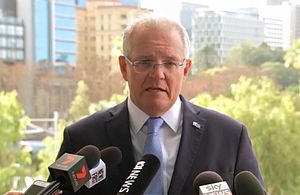The Pacific Islands Forum held in Tuvalu last week ended in disarray with Australian Prime Minister Scott Morrison refusing to budge on negotiations surrounding the country’s dependency on coal as well as limiting global warming to less than 1.5 degrees Celsius (C).
Ahead of the Forum, New Zealand’s Prime Minister Jacinda Ardern warned the Morrison government that it would have to answer to the Pacific for its climate change policy, while other Pacific leaders have repeatedly called on Australia to move away from coal.
Upon arrival at Tuvalu’s Funafuti airport last Wednesday, leaders were welcomed by groups of children who sang: “We have a problem, we need to solve it, we need to start right now.”
Tuvalu’s Prime Minister Enele Sopoaga then asked leaders to take time to consider a model installation that depicted an island in distress surrounded by water, in which some of the children sat.
On many issues, Pacific nations have often looked to Australia for guidance and support. As rising sea levels critically threaten nations such as Tuvalu, Kiribati, and the Solomon Islands, the Pacific Islands Forum was an opportunity for regional cooperation on combating climate change.
Morrison, however, was not willing to let the plight of the Pacific deter him from keeping promises he made during the recent Australian federal election of opening more coal mines. Vanuatu’s foreign minister said the meeting almost broke down twice due to Australia’s refusal to budge on certain “red lines,” including insisting on the removal of mentions of coal and limiting warming to under 1.5C.
Australia has since been accused, as it was after the Forum in 2018, of watering down the communique, which focused heavily on climate change and the need for emissions reductions.
Sopoaga said during the discussions that he told Morrison: “You are trying to save your economy. I am trying to save my people.”
He added that at one-point Tongan Prime Minister Akilisi Pohiva cried as he reflected on a presentation by two young women about their fears for the future.
The prime minister of Fiji, Frank Bainimarama, later said in an interview with the Guardian that Morrison’s approach to negotiation was very heavy-handed, with the Australian prime minister trying to force all the other leaders to sign on to Australia’s views.
Morrison’s approach was “very insulting and condescending,” he said. “We’re supposed to be here for the Pacific islands, not only for Australia.”
The dispute between Australia and its Pacific neighbors reached a tipping point after a video surfaced of Australian Deputy Prime Minister Michael McCormack, saying, “I also get a little bit annoyed when we have people in those sorts of countries pointing the finger at Australia, saying we should be shutting down all our resources sector so that, you know, they will continue to survive… They’ll continue to survive because many of their workers come here and pick our fruit.”
Following McCormack’s comments, Tuvalu threatened to exit Australia’s seasonal worker program and Fiji has ramped up its criticism of the Morrison government.
And while Morrison began his prime ministership just three months ago by visiting the Solomon Islands, which was largely viewed as an attempt to deter growing Chinese influence in the region, several Pacific leaders have now hinted at closer relations with Beijing over Australia’s climate policies.
The former president of Kiribati, Anote Tong, said, “It’s really about the lesser of the two evils, I guess… It’s about our survival. Australia is doing everything that would damage our future.”
“After what we went through with Morrison, nothing can be worse than him,” said Bainimarama.
Samoan Prime Minister Tuilaepa Malielegaoi added to this sentiment by saying the island nations won’t line up with Australia against China. “If countries against China object to Beijing’s support for the region they should come in and provide the assistance that China is providing,” he said.
As the Australian government fended off criticism from the Pacific Island leaders, the Guardian revealed that the British government privately appealed to senior Australian ministers to develop a more “ambitious” climate policy, amid growing concern Australia is not doing enough to cut emissions.
Australia, with a population of 25 million, more than every other country in the Pacific combined, understandably leaves a larger climate footprint than its neighbors. But for its dependency on fossil fuels, Australia ranks third globally behind only Russia and Saudi Arabia. In 2018 Australia’s greenhouse gas emissions hit an all-time-high for a fourth year in a row.
Morrison in particular has a history of embracing coal. In 2017, while Morrison was treasurer, he brought a lump of coal into parliament and taunted the opposition, saying: “This is coal. Don’t be scared. It won’t hurt you, it’s coal.”
During Australia’s recent federal election, Morrison’s Liberal Party voiced support for the opening of the highly controversial Carmichael coal mine in Northern Queensland as well as throwing its support behind other projects such as the planned expansion of the Cameby Downs mine.
On Tuesday, Vanuatu’s foreign minister, Ralph Regenvanu, asked Australia to consider its position carefully on some of these issues and asked the question of whether Australia wants a seat at next year’s Pacific Islands Forum, which is to be held in Vanuatu.
“The declaration contains the words ‘to lead is to act.’ We call on Prime Minister Morrison to lead on climate change. The Pacific wants action, and we want it now,” he wrote.
Joshua Mcdonald is an Australian photographer and journalist.

































